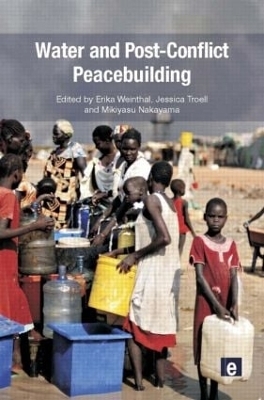
Water and Post-Conflict Peacebuilding
Earthscan Ltd (Verlag)
978-1-84971-232-3 (ISBN)
Water is a basic human need, and despite predictions of "water wars," shared waters have proven to be the natural resource with the greatest potential for interstate cooperation and local confidence building. Indeed, water management plays a singularly important role in rebuilding trust after conflict and in preventing a return to conflict.
Featuring nineteen case studies and analyses of experiences from twenty eight countries and territories in Africa, Asia, Europe, the Americas, and the Middle East, and drawing on the experiences of thirty-five researchers and practitioners from around the world, this book creates a framework for understanding how decisions governing water resources in post-conflict settings can facilitate or undermine peacebuilding. The lessons will be of value to practitioners in international development and humanitarian initiatives, policy makers, students, and others interested in post-conflict peacebuilding and the nexus between water management and conflict.
Water and Post-Conflict Peacebuilding is part of a global initiative to identify and analyze lessons in post-conflict peacebuilding and natural resource management. The project has generated six edited books of case studies and analyses, with contributions from practitioners, policy makers, and researchers. Other books in this series address high-value resources, land, livelihoods, assessing and restoring natural resources, and governance.
Erika Weinthal is an Associate Professor of Environmental Policy at the Nicholas School of the Environment, Duke University, USA. Jessica Troell is a Senior Attorney and Director of the International Water Program at the Environmental Law Institute, USA. Mikiyasu Nakayama is a Professor in the Department of International Studies at the Graduate School of Frontier Sciences, University of Tokyo, Japan.
Foreword Part 1: Basic Services and Human Security Introduction 1. The Role of Informal Service Providers in Post-conflict Reconstruction and State Building 2. A Tale of Two Cities: Restoring Water Services in Kabul and Monrovia 3. Conflict and collaboration for water resources in Angola’s post-war cities 4. Thirsty for Peace: The Water Sector in South Sudan 5. Community Water Management: Experiences from the Democratic Republic of the Congo, Afghanistan, and Liberia 6. Environmental Management of the Iraqi Marshlands in the Post-conflict Period Part 2: Livelihoods Introduction 7. Lessons of Water Resource Management from Perspectives of Irrigation Water-use Management and Flood Control: A Case Study of Japan after World War II 8. Refugee Rehabilitation and Transboundary Cooperation: India, Pakistan, and the Indus River System 9. Despite the Best Intentions? The Political Ecology of Water Resource Management in Northern Afghanistan 10. Water's Role in Security and Stabilization in Helmand Province, Afghanistan Part 3: Peace Processes, Cooperation, and Confidence Building Introduction 11. The Jordan River Basin: A Conflict like no other 12. Transboundary Cooperation in the Lower Jordan River Basin 13. The Sava River: Transitioning to Peace in the Former Yugoslavia 14. Transnational Cooperation over shared Water Resources in the South Caucasus – Reflections on USAID Interventions 15. Water Security and Scarcity: Potential Destabilization in Western Afghanistan and Iranian Sistan and Baluchestan due to Transboundary Water Conflicts 16. Water Resources in the Sudan North-South Peace Process and the Ramifications of the Secession of South Sudan Part 4: Legal Frameworks Introduction 17. Management of Waters in Post-Dayton Bosnia and Herzegovina: Policy, Legal, and Institutional Aspects 18. The Right to Water and Sanitation in Post-conflict Legal Mechanisms: An Emerging Regime? Part 5: Lessons Learned 19. Harnessing Water Management for more Effective Peacebuilding: Lessons Learned
| Erscheint lt. Verlag | 24.2.2014 |
|---|---|
| Reihe/Serie | Post-Conflict Peacebuilding and Natural Resource Management |
| Zusatzinfo | 15 Line drawings, black and white |
| Verlagsort | London |
| Sprache | englisch |
| Maße | 152 x 229 mm |
| Gewicht | 796 g |
| Themenwelt | Naturwissenschaften ► Biologie ► Ökologie / Naturschutz |
| Recht / Steuern ► EU / Internationales Recht | |
| Sozialwissenschaften ► Politik / Verwaltung ► Europäische / Internationale Politik | |
| Sozialwissenschaften ► Politik / Verwaltung ► Staat / Verwaltung | |
| ISBN-10 | 1-84971-232-8 / 1849712328 |
| ISBN-13 | 978-1-84971-232-3 / 9781849712323 |
| Zustand | Neuware |
| Haben Sie eine Frage zum Produkt? |
aus dem Bereich


